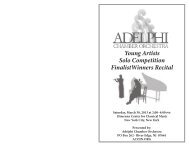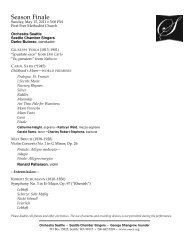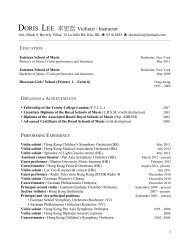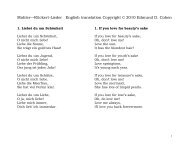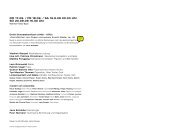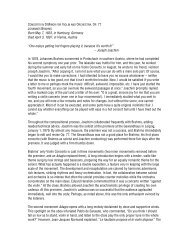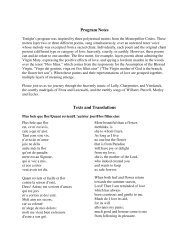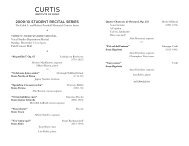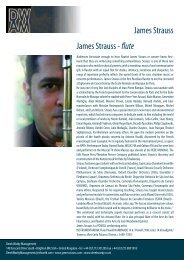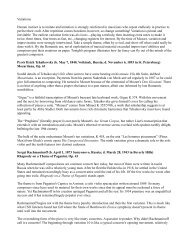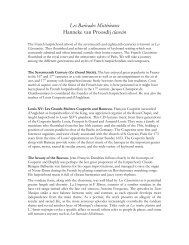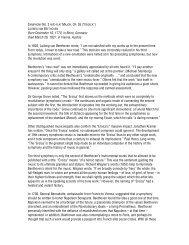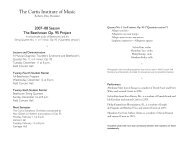Program Notes Translations - InstantEncore
Program Notes Translations - InstantEncore
Program Notes Translations - InstantEncore
You also want an ePaper? Increase the reach of your titles
YUMPU automatically turns print PDFs into web optimized ePapers that Google loves.
Alessandro Scarlatti:<br />
Se Florindo e fedele<br />
If Florindo will be faithful,<br />
I will fall in love with him;<br />
If he is loyal,<br />
I will fall in love with him.<br />
Let him tighten his bow,<br />
That quivering archer,<br />
That I will be able to defend myself<br />
From such a tempting glance.<br />
I will not listen to petitions, tears and quarrels,<br />
But if he will be faithful,<br />
I will fall in love with him.<br />
Sento nel core<br />
I feel in my heart a certain sorrow<br />
Which goes on disturbing my peace;<br />
There shines a torch which inflames my soul.<br />
If it is not love, it will be love soon.<br />
Gia il sole dal Gang<br />
Already, the sun from over the Ganges,<br />
Sparkles more brightly<br />
And dries every drop<br />
Of the dawn, which weeps.<br />
With gilded ray<br />
It adorns each blade of grass;<br />
And the stars of the sky<br />
It paints in the field.<br />
<strong>Program</strong> <strong>Notes</strong><br />
Naperville Chamber players<br />
May 23, 2010<br />
<strong>Translations</strong><br />
George Friedrich Händel:<br />
Flammende Rose<br />
Flaming rose, earth’s adornment<br />
Enchanting glory of all radiant gardens.<br />
All eyes that see your magnificence<br />
Dazzled by your charm must confess<br />
That you were made by the finger of God.<br />
Singe Seele<br />
Sing, my soul, sing in praise of God,<br />
Who in such wise ways<br />
And so masterfully adorns the world.<br />
He stimulates us through our hearing,<br />
Delights us through our sight,<br />
Making trees and fields blooming with flowers.<br />
Let him be renowned and praised.<br />
Antonio Vivaldi:<br />
Mentiti contenti<br />
False happiness<br />
Is the true torment<br />
Of the faithful lover.<br />
Those piercing glances<br />
Are like arrows<br />
That quiver with pain.<br />
Cruel beauty!
<strong>Program</strong> <strong>Notes</strong><br />
Alessandro Scarlatti (1660-1725) was both the founder of the Neopolitan school of opera and an<br />
important bridge to the Classical period. His music is identified by beautifully refined melodies and rich,<br />
full accompaniments. Scarlatti helped establish the nearly universal use of the da capo aria form (ABA). “Se<br />
Florindo è fedele” is a playful aria from the opera La donna ancora è fedele (The Lady Still Is Faithful), in which<br />
the singer has just overheard Florindo profess his love. From a chamber cantata meant to be performed in<br />
the home, "Sento nel core" is an aria that expresses the fear and uncertainty of falling in love. "Già il sole<br />
dal Gange" is an aria from the opera L'Honesta negl'Amori" (Honesty in Love Affairs), the composer’s second<br />
opera written at the age of nineteen.<br />
Henry Purcell (1659-1695), one of the finest English composers of the Baroque era, wrote only<br />
one full opera: the tragedy, Dido and Aeneas. "When I am Laid in Earth," often referred to as Dido's<br />
Lament, opens with a descending chromatic line, a ground bass which is repeated eleven times throughout<br />
the aria. Purcell utilizes text painting throughout the aria, but particularly in the ground bass which<br />
relentlessly trudges downward, as Dido meets her fate: death. Dido's Lament is included in many music<br />
textbooks for its exemplary use of ground bass.<br />
George Friedrich Handel (1685-1759) is best known for his oratorio, Messiah. In Part Three of<br />
the oratorio, the spiritual messages represented by Christ’s teachings are set forth for the instruction and<br />
benefit of all, opening with the moving aria I Know That My Redeemer Liveth. Handel's "Nine German Arias"<br />
(he wrote other arias in German, but this is a discrete group) were written in the mid-1720s, long after the<br />
composer left his native Germany for Italy and then England. These arias present spirituality in an<br />
intimate way, with a good deal of imagery from nature subtly reflected in the music.<br />
The prolific Venetian composer Antonio Vivaldi (1678-1741) wrote many chamber works for<br />
various instruments, including about 90 sonatas. The Sonata in a minor was originally written for flute and<br />
bassoon, performed today on cello. All'ombra di sospetto is among 36 of Vivaldi's chamber cantatas. The<br />
cantata texts generally revolve around love and its joys and sorrows, and the settings can be quite<br />
emotionally expressive. The scoring is typically for voice and continuo, although “All’ombra” involves<br />
obbligato flute. Though often accused of repeating his own material, Vivaldi was highly imaginative, and his<br />
works exercised a strong influence on Johann Sebastian Bach.<br />
Bernardo Storace (fl. 1664) is survived by his only remaining work, Selva di Varie Compositioni<br />
D'Intavolatura per Cimbalo ed Organo, published in 1664. The title page from this collection provides us with<br />
Storace's only known biographical fact: his employment as Vice-Maestro di Cappella to the senate of<br />
Messina. The Ciaccona heard tonight is an excellent example of his intense creativity manifest through the<br />
ground bass forms.
J.S. Bach (1685-1750) is widely considered the greatest and most prolific composer in world<br />
history. He was a masterful organist and harpsichord player who mainly worked as a church music director<br />
writing thousands of brilliant sacred works. It was when he was full of fresh youthful energy in his late<br />
twenties that he composed the Six Suites for Violoncello, published in 1720.<br />
Violoncello is the old name for the cello. The cello had not yet fully been developed at this time.<br />
Not even an endpin was used at this time and there were no female cellists that we know of until the 19 th<br />
century. That is because it was considered terribly impolite for a woman to be seated with her legs open<br />
like that! The cello’s ancestor, the viola da gamba, was primarily used as an accompaniment instrument in<br />
the background.<br />
This period of time was unusual for Bach since he was employed by a wealthy prince in Cöthen,<br />
Germany and was not required to compose or perform exclusively sacred music in a church. Bach took<br />
some time as director of a chamber orchestra to learn how to play the viola da gamba and the violin. He<br />
wrote almost all of his orchestral suites and instrumental chamber works during this time. These<br />
unaccompanied cello suites are the first masterpieces we know of ever written for the cello and they<br />
represent one of the most beloved jewels in the cello repertoire to this day. The technical demands involve<br />
complex bowing combinations, double stops (playing two or three notes at time) and long arpeggios.<br />
As a “modern cellist,” I have struggled to adapt my playing to a more “authentic” and Baroquely<br />
beautiful interpretation of what Bach intended. I don’t have the proper gut strings (made of sheep’s gut)<br />
that would produce the kind of sound of 300 years ago but I have eliminated as much vibrato, gratuitous<br />
shifting and long, sustained dramatic musical lines of Romantic aesthetic as I can. We “modern cellists” have<br />
a great deal of conflict giving up these habits for the good of the music but now I have been humbly<br />
converted by the beauty that is not so much my strong personal interpretation but the magic of what lies<br />
beyond my modern musical imagination.<br />
I like to fancifully think that Bach was listening to one of his two brilliant cellists in the court one<br />
day playing this very D minor Suite and instantly fell in love with his wife, Anna Magdalena as she stood up<br />
to sing one day. And the rest is history with her bearing him 21 children and lovingly hand copying out this<br />
set of Six Suites!<br />
Scarlatti, Purcell, Handel, Vivaldi program notes: Jessica Koch<br />
Storace program notes: Mark Shuldiner<br />
Bach program notes: Dorothy Deen



